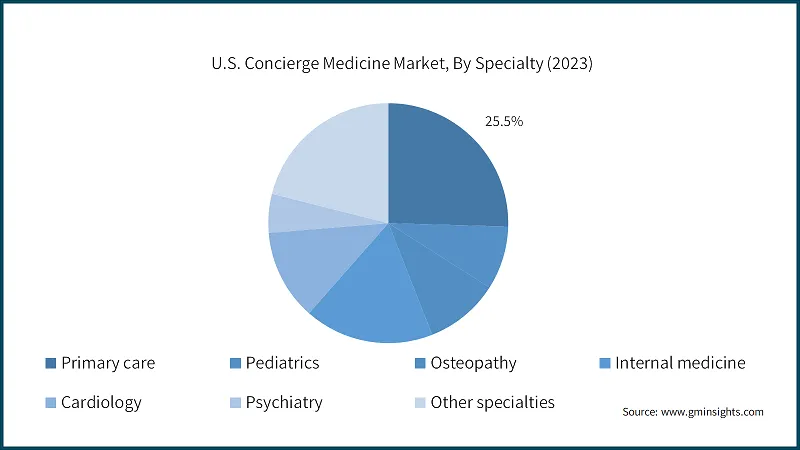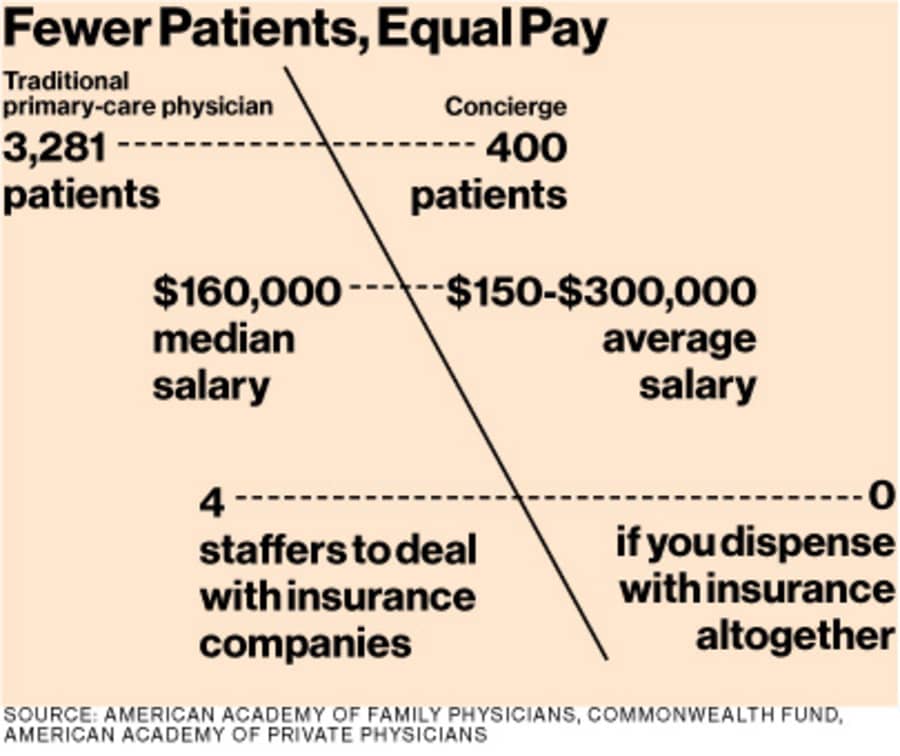As more people seek personalized healthcare solutions, a common question arises: “What is a concierge doctor?”
Concierge medicine is a rapidly growing model that offers patients access to personalized medical care. Its popularity is soaring among patients but even doctors are increasingly going to concierge medicine, promising a more attentive and individualized approach to health.
In this blog, we will demystify the concept of concierge doctors, address common misconceptions, and explain what you can expect from these luxury healthcare services.
What is a Concierge Doctor?
Have you ever wished for a doctor who has the time to really get to know you and your health needs? That’s exactly what a concierge doctor offers, providing personalized medical care with an enhanced duty of care.
Unlike traditional primary care physicians who juggle a large number of patients, concierge doctors intentionally keep their patient load small. This means more time for you, whether it’s for same-day appointments, extended visits, or direct communication through phone, email, or text.
But what truly sets a concierge doctor apart is their focus on preventive healthcare. They don’t just treat illnesses; they work with you to create a personalized health plan designed to keep you healthy in the long run. By bypassing the traditional insurance model, concierge doctors cut out the bureaucratic red tape that often delays care. Instead, you pay a flat fee—monthly, biannual, or annual—which grants you comprehensive access to their services.
So, if you’re tired of rushed appointments and fragmented care, a concierge doctor might just be the solution you’ve been looking for.

How do Concierge Doctors Work?
Concierge doctors are transforming the healthcare landscape with their personalized approach to patient care.
But how exactly do they operate, and what makes them unique? Let’s delve into the work model, qualifications, duties, and specialties of concierge doctors.
Main Duties
The primary duties of concierge doctors encompass a broad spectrum of healthcare services:
- Preventive care: They focus on keeping you healthy with regular check-ups and personalized health plans tailored just for you.
- Primary care: From diagnosing illnesses to managing chronic conditions, they cover all bases.
- Urgent care: Have a minor injury or sudden health concern? They’ve got you covered with concierge emergency medicine, often eliminating the need for a separate urgent care visit.
- Lifestyle medicine: Concierge doctors provide advice on nutrition, exercise, stress management, and more, helping you lead a healthier life.
Background and Qualifications
Concierge doctors undergo the same rigorous training as any other physician. Their journey includes:
- Undergraduate degree: Four years of rigorous college education.
- Medical school: Another four years to earn their MD (Doctor of Medicine) or DO (Doctor of Osteopathic Medicine) degree.
- Residency: Three to eight years of specialized training, honing their skills in various medical fields.
- Optional fellowship: Some go further, spending an additional year focusing on a specific specialty.
Specialties
Concierge doctors often bring specialized skills to the table, enhancing the care they can provide:
- Chronic disease management: Offering detailed and continuous management plans for conditions like diabetes or heart disease.
- Geriatric care and pediatric concierge medicine: Providing specialized care for older adults and children, ensuring family members of all ages receive comprehensive medical attention.
- Sports medicine: Catering to athletes with injury prevention and treatment strategies.

Common Misconceptions and Facts Around Concierge Doctors
Concierge medicine is often misunderstood, leading to several myths about what concierge doctors do and who can benefit from their services. Let’s debunk some of these common misconceptions and reveal the facts.
Myth 1: Concierge Doctors’ Cost is Beyond Reach for Most Patients
Fact: While it’s true that concierge medicine involves an upfront fee, the cost is often more accessible than people think. Many concierge practices offer a membership model where patients pay one fee for access to a team of board-certified doctors.
On average, the concierge medicine cost can vary between $2,000 and $10,000 annually. But remember that this can cut additional out-of-pocket fees by providing comprehensive care under one umbrella. Investing in concierge medicine also emphasizes wellness and prevention, potentially reducing overall medical costs in the long run.
Myth 2: Concierge Doctors Lack Specialty and Comprehensive Care
Fact: Another common misconception is that concierge doctors only provide basic primary care. Concierge practices often include a wide range of medical specialties within their teams of qualified, board-certified physicians.
This ensures that patients receive comprehensive care that covers all their health needs, from routine check-ups to specialized treatments.
Myth 3: Concierge Doctors are Scarce
Fact: While traditional concierge practices might be limited to certain areas, innovative models transcend these limitations.
For instance, some services offer 24/7 availability at home or while traveling, ensuring patients can access their concierge doctor anytime and anywhere. This availability addresses the myth of scarcity by providing consistent, reliable care regardless of location.
Myth 4: Concierge Doctors Don’t Take Insurance
Fact: It’s a myth that concierge doctors completely operate outside of the insurance system. While they primarily rely on membership fees, many concierge practices will work within patients’ insurance networks, especially when facilitating referrals to specialists.
This concierge medicine approach to insurance not only helps prevent out-of-pocket costs but can also eliminate the need for separate office or specialist visits, integrating smoothly with your existing insurance coverage.
Myth 5: Concierge Doctors are not Flexible with Primary Care
Fact: Flexibility is a hallmark of concierge medicine, especially with models that integrate seamlessly with primary care.
WorldClinic includes Membership benefits like sourcing and vetting top local medical professionals and complete integration with primary physicians and specialists. This ensures patients receive coordinated and comprehensive care, making the transition to or from traditional primary care smooth and efficient.

Why and How to Choose the Right Concierge Doctor?
Choosing the right concierge doctor can significantly enhance your healthcare experience. Here’s a brief guide to help you make an informed decision, ensuring the benefits of concierge medicine outweigh any potential drawbacks:
- Assess your needs: First, you should identify your healthcare priorities, such as specialized care, continuous access, or a focus on preventive health.
- Research credentials and experience: Verify the doctor’s education, board certifications, and specializations. Ensure they have extensive experience relevant to your health needs.
- Evaluate the doctor-patient relationship: It’s a good idea to look for reviews and schedule an introductory meeting to understand if the doctor is a good fit for you.
- Understand membership plans and pricing: Compare the costs and services included in the concierge medicine plans offered to find the best value for comprehensive care.
- Consider accessibility: Ensure the doctor offers same-day appointments and 24/7 availability, as these can significantly enhance your healthcare experience and give you peace of mind.
- Focus on preventive care: Choose a doctor who emphasizes preventive health to catch issues early and manage them proactively.
- Look for comprehensive services: Ensure that the practice you choose has a team of specialists that covers all aspects of your health needs.
Conclusion
Concierge doctors offer a personalized, comprehensive approach to healthcare that focuses on preventive care and enhanced patient-doctor relationships. This model provides direct access to physicians, longer appointment times, and tailored health plans.
WorldClinic is a premium concierge medical provider with a team of board-certified doctors committed to providing exceptional care. In premium practices like WorldClinic, the typical patient-to-doctor ratio (80:1) is significantly lower than in traditional healthcare (2500:1), allowing for deeper, more meaningful doctor-patient relationships.
Whether you need executive healthcare solutions, concierge personalized medicine, or concierge family medicine, WorldClinic has a solution tailored for you.
Ready to experience the difference of concierge medicine? Contact us and start your journey towards better health and personalized care.
Frequently Asked Questions
1. Are Concierge Doctors Worth it?
If you’re looking for personalized care, longer appointment times, and 24/7 access to your physician, opting for a concierge doctor is worth it.
This ensures that your doctor knows your health history intimately, leading to more tailored and effective healthcare solutions.
2. How Much Does a Concierge Doctor Cost?
The cost of a concierge doctor can vary widely depending on the practice and location. On average, annual fees range from $2,000 on the low and to over $50,000 on the high end.
Some practices offer monthly payment plans to make the fees more manageable. This fee typically covers enhanced access to your doctor, extended visits, and preventive care services.
3. Do Concierge Doctors Take Insurance?
Concierge doctors primarily operate on a membership fee basis, but many also work within patients’ insurance networks for specialist referrals and hospital care.
This approach can help reduce out-of-pocket costs and streamline the healthcare process. Before opting for a given concierge medicine service, you should check its policies regarding insurance.
4. Are Concierge Doctor Fees Tax Deductible?
Generally, concierge doctor fees are not tax deductible as medical expenses. However, certain services provided within the membership might qualify for deductions if they are deemed necessary medical expenses.
It’s best to consult with a tax advisor for personalized advice based on your specific situation.
5. How Many Patients Does a Concierge Doctor Have?
Concierge doctors typically have a much smaller patient panel compared to traditional primary care physicians.
While a traditional doctor might see thousands of patients, a concierge doctor usually manages a few hundred. This smaller patient load allows for more personalized care and better accessibility.


